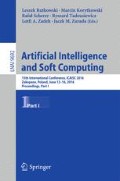Abstract
This paper is aimed at the engineering evaluating of 3 well-known temporal logic systems: of the Linear Temporal Logic (LTL), of a Fuzzy Linear Temporal Logic (FLTL) and some alternative fuzzy extension of LTL – called a Fuzzy-Time Temporal Logic as a system suitable for an explicit rendering of a fuzzy nature of time. We intend to formulate and defend the thesis – on a base of a behavior of robot in the block world – that chosen systems are only partially capable of satisfying typical requirements of engineers.
Access this chapter
Tax calculation will be finalised at checkout
Purchases are for personal use only
Notes
- 1.
Sometimes, further operators such as \(\mathcal {AG}\) (“almost always”) and \(\mathcal {AG}_{t}\) read as “almost always in the next t instances” are considered. We omit them for a simplicity of the semantics presentations.
References
Allen, J.: Maintaining knowledge about temporal intervals. Commun. ACM 26(11), 832–843 (1983)
Antonniotti, M., Mishra, B.: Discrete event models \(+\) temporal logic \(=\) supervisory controller: automatic synthesis of locomotion controllers. In: Proceedings of IEEE International Conference on Robotics and Automation (1999)
Bacchus, F., Kabanza, F.: Using temporal logic to express search control knowledge for planning. Artif. Intell. 116, 123–191 (2000)
Emerson, A.: Temporal and modal logic. Handbook of Theoretical Computer, vol. B, pp. 995–1072. Elsevier, Amsterdam (1990)
Fainekos, G., Kress-Gazit, H., Pappas, G.: Hybrid controllers for path planning: a temporal logic approach. In: Proceeding of the IEEE International Conference on Decision and Control, Sevilla, pp. 4885–4890, December 2005
Fainekos, G., Kress-Gazit, H., Pappas, G.: Temporal logic moton planning for mobile robots. In: Proceeding of the IEEE International Conference on Robotics and Automaton, pp. 2032–2037 (2005)
Frigeri, A., Pasquale, L., Spoletini, P.: Fuzzy Time in LTL. In: Logic in Computer Science (2012)
Gabbay, D., Kurucz, A., Wolter, F., Zakharyaschev, M.: Logics, Many-Dimentional Modal: Theory and Application. Elsevier, Amsterdam (2003)
Grobler-Debska, A., Kucharska, E., Dudek-Dyduch, E.: Idea of switching algebraic-logical models in flow-shop scheduling problem with defects. In: Methods and Models in Automaton and Robotics (MMAR), pp. 532–537 (2013)
Halpern, J., Shoham, Y.: A propositional modal logic of time intervals. J. ACM 38, 935–962 (1991)
Jobczyk, K., Ligeza, A.: Systems of temporal logic for a use of engineering. towards a more practical approach. In: Stýskala, V., Kolosov, D., Snášel, V., Karakeyev, T., Abraham, A. (eds.) EMACOM 2015. Advances in Intelligent Systems and Computing, vol. 423, pp. 147–157. Springer, Switzerland (2016)
Jobczyk, K., Ligeza, A.: Temporal planning in terms of a fuzzy integral logic (FLI) versus temporal planning in PDDL. In: Proceedings of INISTA, pp. 1–8 (2015)
Jobczyk, K., Ligeza, A., Karczmarczuk, J.: Fuzzy temporal approach to the handling of temporal interval relations and preferences. In: Proceedings of INISTA (2015)
Maximova, L.: Temporal logics with operator ‘the next’ do not have interpolation or Beth property. Sibirskii Matematicheskii Zhurnal 32(6), 109–113 (1991)
Pnueli, A.: The temporal logic of programs. In: Proceedings of the 18th Annual Symposium on Foundation of Computer Science, pp. 46-57 (1977)
van Benthem, J., Bezhanishvili, G.: Modal logic of space. In: Aiello, M., Pratt-Hartmann, I., Van Benthem, J. (eds.) Handbook of Spatial Logics. Springer, Netherlands (2007)
Author information
Authors and Affiliations
Corresponding author
Editor information
Editors and Affiliations
Rights and permissions
Copyright information
© 2016 Springer International Publishing Switzerland
About this paper
Cite this paper
Jobczyk, K., Ligeza, A., Kluza, K. (2016). Selected Temporal Logic Systems: An Attempt at Engineering Evaluation. In: Rutkowski, L., Korytkowski, M., Scherer, R., Tadeusiewicz, R., Zadeh, L., Zurada, J. (eds) Artificial Intelligence and Soft Computing. ICAISC 2016. Lecture Notes in Computer Science(), vol 9692. Springer, Cham. https://doi.org/10.1007/978-3-319-39378-0_20
Download citation
DOI: https://doi.org/10.1007/978-3-319-39378-0_20
Published:
Publisher Name: Springer, Cham
Print ISBN: 978-3-319-39377-3
Online ISBN: 978-3-319-39378-0
eBook Packages: Computer ScienceComputer Science (R0)

